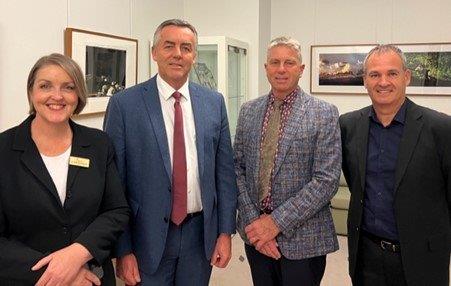The fight to save the native hardwood timber industry needs to become a national issue, according to Federal Member for Gippsland Darren Chester.
Mr Chester led a delegation of three Gippsland Mayors in meetings with senior government and opposition representatives in Federal Parliament with a focus on the Victorian Government’s decision to ban all native hardwood timber harvesting on public land from January 1, 2024.
Wellington’s Ian Bye, East Gippsland Shire’s Mark Reeves and Latrobe City’s Kellie O’Callaghan were united in their support for timber workers and their families as they highlighted the social, economic, cultural and environmental impacts of the Victorian announcement.
“The meetings were respectful and courteous but the Federal Labor Government has confirmed there is no plan to intervene in this heartless and illogical decision by Premier Dan Andrews,” Mr Chester said.
“We met with Minister for Agriculture Murray Watt and a representative of the Prime Minister’s office who made it clear that the Federal Government supports the native hardwood timber industry.
“While I welcomed their support, the fact is they have no plans to get involved in the debate in Victoria and no intention of standing up for blue collar workers in our community.”
Mr Chester said the delegation also met with Opposition Leader Peter Dutton and Shadow Minister Jono Duniam who expressed their commitment to a sustainable native hardwood timber industry.
“This is now an issue of national importance because the demand for timber products isn’t decreasing and Victoria will simply raid other states for timber or import from other countries with poorer environmental standards,” Mr Chester said.
“There will be price impacts on Australians wanting to build or renovate a home, supply chain insecurities, and poorer global environmental outcomes if Australia keeps locking up its native timber industry.
“The Prime Minister needs to get involved in this debate and add his voice to the sensible Australians who understand how we need a sustainable native timber industry and a plantation sector as part of a viable forest industry.
“If he doesn’t act now and give this issue the full attention of a National Cabinet discussion, we will see timber communities decimated across Australia and a growing dependence on imported products.”
Mr Chester has repeated his challenge to crossbench and Labor MPs who support further native timber industry bans to visit his electorate and meet with industry and community leaders.
“They are barking up the wrong tree with their misinformed commentary on a complex industry they haven’t bothered to understand,” Mr Chester said.
“We are seeing some MPs from the most privileged suburbs of Australia seeking to sack workers with some of the lowest household incomes in the nation based on their total ignorance of the native hardwood timber industry.
“Rather than ignorantly lecturing my timber families, I extend an open invitation to any of the cross-benchers and Labor MPs to visit Gippsland, meet industry and community leaders, and get a first hand appreciation of the way they manage the bush for a sustainable industry.
“Anyone who has bothered to do some research would know the native hardwood timber industry has changed dramatically over the past 30 years across regional Australia.
“It’s now a sophisticated, world-class and environmentally-sustainable industry that supports Australian jobs, protects our communities and wildlife from bushfires, and reduces our carbon footprint.
“Surely these MPs can understand the alternative to harvesting local timber on a long-term rotational basis is to import more timber from countries with poorer environmental protocols?
“We already import more than $5 billion of timber products from developing nations and that figure would only increase if this simplistic concept of more bans is supported by the Prime Minister.
“A sustainable native hardwood timber industry is part of the answer to reducing Australia’s carbon emissions as timber products sequester carbon in our floorboards, furniture and other timber products.
“Re-growing trees can increase and maintain the role of forests as carbon sinks and is the ultimate renewable resource.”
Mr Chester also repeated his concerns for country communities if skilled timber workers were forced out of their jobs.
“Operating heavy equipment in a bush environment takes skill and they are a critical resource during the fire season that won’t be available for future natural disasters if we lose this industry,” Mr Chester said.
“This will become an issue of national safety and the Federal Government can’t sit back and let Premiers put country communities at risk. This has nothing to do with environmental science… it’s all about political science for Premiers chasing green votes in the suburbs at the expense of blue collar workers.”

Pictured: Cr Kellie O’Callaghan, Darren Chester, Cr Mark Reeves and Cr Ian Bye formed a delegation to discuss the future of the native hardwood timber industry in Federal Parliament.

